Related Research Articles

The Dytiscidae – based on the Greek dytikos (δυτικός), "able to dive" – are the predaceous diving beetles, a family of water beetles. They occur in virtually any freshwater habitat around the world, but a few species live among leaf litter. The adults of most are between 1 and 2.5 cm (0.4–1.0 in) long, though much variation is seen between species. The European Dytiscus latissimus and Brazilian Megadytes ducalis are the largest, reaching up to 4.5 and 4.75 cm respectively. In contrast, the smallest is likely the Australian Limbodessus atypicali of subterranean waters, which only is about 0.9 mm (0.035 in) long. Most are dark brown, blackish, or dark olive in color with golden highlights in some subfamilies. The larvae are commonly known as water tigers due to their voracious appetite. They have short, but sharp mandibles and immediately upon biting, they deliver digestive enzymes into prey to suck their liquefied remains. The family includes more than 4,000 described species in numerous genera.

Hygrotus is a genus of beetle in family Dytiscidae. It contains two subgenera and about 70 species, including:

Rhantus is a genus of beetle in family Dytiscidae. There are about 100 species distributed worldwide. They often live in pools and marshy habitat types. Several species have colonized oceanic islands and become endemics.

Agabus is a large genus of predatory aquatic beetles in the family Dytiscidae, proposed in 1817 by William Elford Leach and named after Agabus, an early follower of Christianity. The adult beetles are moderate-sized, 5 to 14 mm long. The genus is primarily Holarctic in distribution, with only a few species known from the Afrotropical and Neotropical realms. Three species of Agabus, namely A. clypealis, A. discicollis and A. hozgargantae are endangered according to the IUCN Red List. The division into subgenera is not widely accepted. However, a number of species groups are recognized after the works of David J. Larson and Anders N. Nilsson. The genus is probably polyphyletic or paraphyletic. In a recent study of mitochondrial DNA, Agabus was found paraphyletic with respect to several of the species groups of Platambus, a closely related genus in the tribe Agabini. Lately the taxonomy of the genus has been revised, and some groups of species were transferred from Agabussensu stricto to other genera in the tribe Agabini.

Ilybius is a large genus of predatory aquatic beetles in the family Dytiscidae. The genus is native to the Palearctic, the Near East, the Nearctic, and North Africa. 70 species has been described from this genus:
Gyrinus is a genus of small aquatic whirligig beetles in the family Gyrinidae native to the Palearctic, the Near East, the Nearctic, North Africa, Asia and Australia.

Laccophilus is a genus of water beetle found in nearly every temperate or tropical region in the world including but not limited to Europe, the Near East, the Nearctic, North Africa and the Oriental region. It contains the following species:
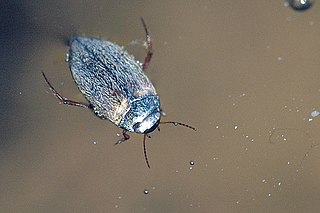
Hydroporus is a genus of water beetles native to the Palearctic, the Nearctic, the Near East, and North Africa. It contains the following species:
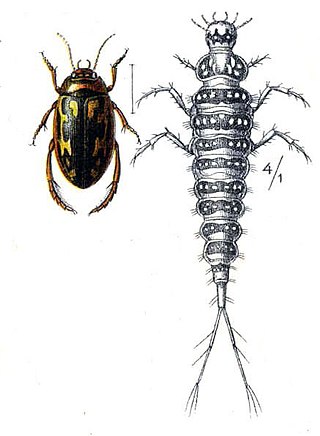
Platambus is a genus of beetle native to the Palearctic, including Europe, the Near East and North Africa. It distinguished by a wide epipleuron. The ventral surface has spot markings.

Hydaticus is a genus of predatory water beetle belonging to the family Dytiscidae. Hydaticus can be found throughout most of the world. There are 150 described species and 12 subspecies in two subgenera in the genus Hydaticus.

Thermonectus is a genus of beetles in the family Dytiscidae. This genus is native to the New World, and mainly from warm temperate to tropical in distribution, but one species, T. basillaris occurs as far north as southern Ontario, Canada. They inhabit a wide range of freshwater habitats with static water and are often common. They are generally about 0.8–1.5 cm (0.3–0.6 in) long and a few species from desert pools in North America have a distinct yellow-spotted pattern on a black background.

Cybister, is a genus of beetle in family Dytiscidae. They are found in much of the world, including all continents except Antarctica. As of 2024 there are 98 species and 9 additional subspecies among four subgenera in the genus.

Liodessus is a genus of beetles in the family Dytiscidae, containing the following species:

Neobidessus is a genus of beetles in the family Dytiscidae, containing the following species:
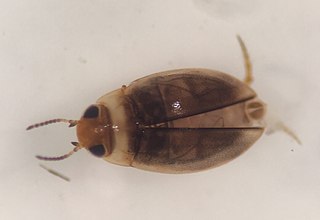
Uvarus is a genus of beetles in the family Dytiscidae, containing the following species:

Heterosternuta is a genus of beetles in the family Dytiscidae, containing the following species:

Hydrocolus is a genus of beetles in the family Dytiscidae, containing the following species:
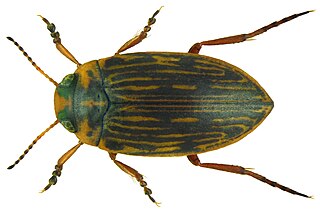
Stictotarsus is a genus of beetles in the family Dytiscidae.
Desmopachria is a genus of beetles in the family Dytiscidae, containing the following species:
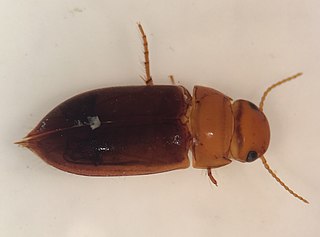
Celina is a genus of predaceous diving beetles in the family Dytiscidae. There are at least 30 described species in Celina.
References
- "ITIS Report – Taxonomic Hierarchy". ITIS.gov. 2010. Retrieved April 29, 2011.